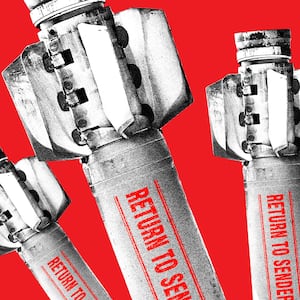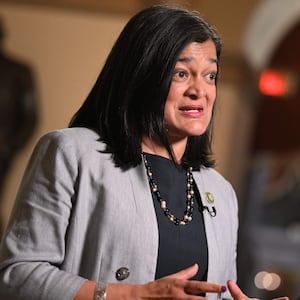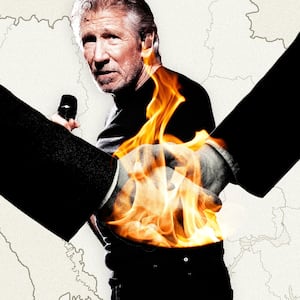Republican Presidential candidate Vivek Ramaswamy is supposed to be anti-war, right?
He certainly talks that way when the subject is Ukraine or the Middle East. On Tuesday, in response to criticism from GOP strategist Karl Rove, Ramaswamy quipped, “Karl, I’m sorry we won’t be invading Iraq again. Get over it.”
Like numerous figures on the opposite end of the political spectrum, Ramaswamy has advocated de-escalation and peace talks in Ukraine. Slamming him for this position at last week’s Republican debate, former South Carolina Gov. Nikki Haley said Ramaswamy was “choosing a murderer”—Russian President Vladimir Putin—over an American ally. Ramaswamy shot back, “I wish you success on your future career on the boards of Lockheed and Raytheon.”
That response almost made Ramaswamy sound like a Code Pink activist. And as little as I think of most of the rest of what he stands for, my own views on Ukraine put me far closer to Ramaswamy than to Haley.
But when the subject changes from Eastern Europe to East Asia, Ramaswamy undergoes a Jekyll-to-Hyde transformation. Suddenly, this “anti-war” candidate seems eager to start World War III.
Ukraine and Taiwan
Ramaswamy has advocated a “Korean War-style armistice” in Ukraine. When he says things like that, I nod along. There’s already been a staggering loss of life since the war started last February, neither Russia nor Ukraine seems likely to win a total victory on the battlefield any time soon, and the worst-case scenario for a longer war is much worse than what’s already happened.
Last year, a Russian fighter jet in Crimea nearly shot down a British surveillance plane. In another incident, a stray missile hit NATO member-state Poland. Initial reports blamed Russia and a number of politicians and media personalities called for NATO to activate Article V of the alliance’s charter, which states that an “armed attack” on any member “shall be considered an attack against them all” and commits every member-state to come to the assistance of the attacked country.
It turned out that the stray missile was fired by Ukrainian forces, but it was an unsettling reminder of the possibility for U.S. involvement in the war to escalate to direct confrontation with nuclear powers.
Even so, it could be worse.
Imagine if the United States’ response to Russia’s invasion last February hadn’t just been military aid to Ukraine, economic sanctions on Russia, and diplomatic opposition to peace talks. Imagine if Joe Biden had instead ordered the U.S. military to march into Ukraine to fight side by side with Ukrainian forces.
Even if Biden’s Ukraine policy has been far more hawkish than Ramaswamy and I would like, we can all be grateful that he didn’t do that. No one can know for sure, but it’s entirely possible that if he had, the war would have gone nuclear and you wouldn’t be reading this or any other online article. Even if you were among the survivors, the infrastructure needed to have things like an internet would be gone.
Bizarrely enough, though, what Biden didn’t do in Ukraine is exactly what Vivek Ramaswamy is promising to do if he’s president, and the exact equivalent to the war in Ukraine breaks out in Asia. Taiwan, like Ukraine, is an American ally but not a member of NATO or any similar alliance. The U.S. has long given military aid to Taiwan but maintained a posture of “strategic ambiguity” about what the U.S. itself would do if China ever tried to retake its breakaway province by force.
Ramaswamy wants to abandon that ambiguity and commit the United States to directly entering any such war.
As he notes, he’s the “only candidate” to advocate this policy. It’s not hard to see why.
While the exact number is a state secret, the Pentagon estimates China has more than 400 nuclear warheads. That’s a tiny fraction of the American stockpile, but more than enough for a nuclear exchange between the two nations to have civilization-shattering consequences. There’s a reason why, since the dawn of the Cold War, the idea of nuclear powers going to war has terrified every minimally rational person.
Getting Serious About World War III
Albert Einstein is supposed to have quipped that, whatever weapons World War III ends up being fought with, the result would be that World War IV would be fought with “sticks and stones.” Let’s make the optimistic assumption that he was wrong.
Pretend that we could somehow be sure that a war between China and the United States stayed conventional like World War I and World War II.
I’d advise anyone inclined to be cavalier about what that would look like to visit the Vietnam Memorial Wall in Washington, D.C. It chronologically lists the 58,000 names of the U.S. servicemen who gave their lives in that conflict from 1957 to 1975. As you look over all those names, remember that this was a war fought against poor peasants in a tiny and underdeveloped nation—and think hard about the differences between Vietnam in the 1970s and the People’s Republic of China today.
Just to start with, the Chinese and American economies are systematically linked. An abrupt disentanglement would be devastating for ordinary Americans.
But even that could be the least of the consequences of a U.S./China war. Even in the most optimistic scenario for how such a war would play out, how many names do you suppose would end up on a future “China Memorial Wall” in Washington, D.C.?
China’s People’s Liberation Army is the single largest armed force on the planet, with more than 2 million active personnel. The U.S. military has about 1.4 million. Take a beat and really think about those two forces directly colliding, using conventional military technology unfathomably more advanced than anything that existed the last time there was a direct war between great powers.
Vivek Ramaswamy is willing to trigger that apocalypse to save the U.S. economy from relying on China for the “cutting-edge semiconductors” currently manufactured in Taiwan. That’s dangerously insane. However bad you think it is that Joe Biden is willing to risk a war with a major nuclear-armed power, you can multiply that by a thousand when describing a candidate who explicitly promises that he would start such a war.
In his clash with Nikki Haley, Ramaswamy talked like a critic of the military-industrial complex. But if you listen carefully even to his pronouncements about Ukraine, the main reason he wants peace in Eastern Europe is so the United States can focus on the ‘real threat’ in East Asia.
One of the slogans promulgated by the ruling party in George Orwell’s dystopian novel 1984 was “War is peace.” It’s in this sense, and only in this sense, that Vivek Ramaswamy is on the side of peace.









